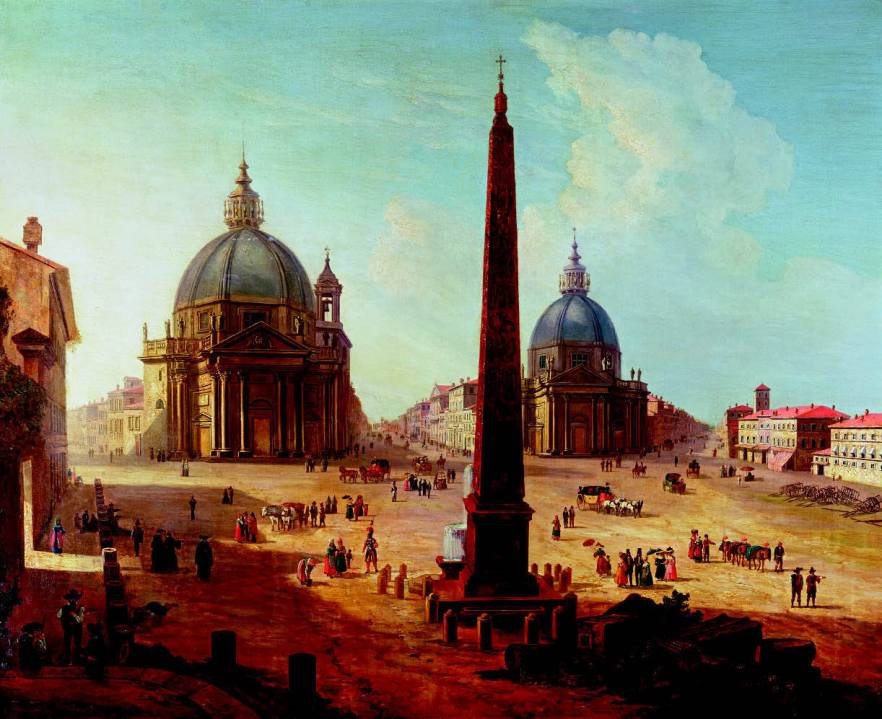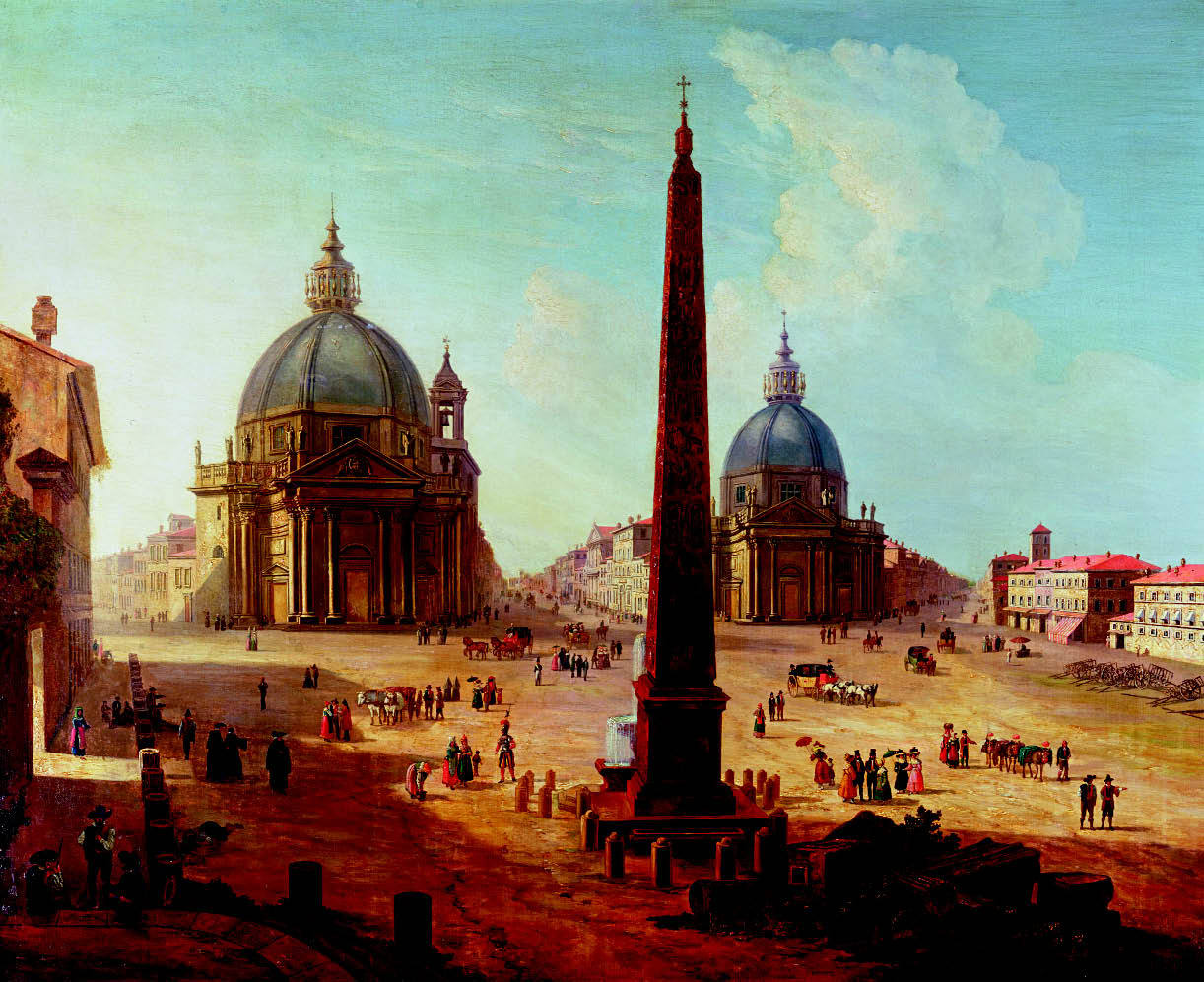In the autumn of 1984, after an unexplained fall, I found myself in a hospital in Rome acutely head-injured and disorientated. I had been found sprawled on the floor of my flat on Via Salaria; the police suspected an intruder, yet nothing apparently was stolen. Bloody handprints covered the walls where I had tried to steady myself. I was 23 and newly arrived in Rome to work as a journalist and teach. Later, I regained consciousness outside a latrine on the sixth floor of San Giovanni hospital. A group of nuns with elaborate bird-like coifs swished past, each bearing a carafe of white wine. So I was in paradise — or perhaps a Fellini movie. (The carafes turned out to contain urine samples.) The nuns acted as paramedics, owing to a shortage of trained nurses. After surgery, they suggested that I sleep on the hospital roof during the day as the ward was so stuffy. A makeshift bed was set up on the terrace overlooking the basilica of San Giovanni and the Egyptian obelisk which Pope Sixtus V had erected in the 16th century. At a distance of over 25 years, I still have no idea what happened.
For the art critic Robert Hughes, Rome is an ‘enormous concretion of human glory and human error’, where centuries of murky history confront the visitor. The city has changed immensely since Hughes first visited in 1959, however. Each year an estimated three million tourists descend on the Colosseum alone. Many of them are excited by stories of gladiators and martyred Christians, only to be hustled for cash by youths dressed as Roman centurions. (In between shifts, these Felliniesque wideboys can be seen phoning their girlfriends or smoking cigarettes in the adjacent Metro station coffee bar, their plumed helmets resting on the counter.)
In pages of trenchant prose, Hughes chronicles the art and architecture of Rome from the Emperor Augustus up to Federico Fellini. This is quite an undertaking, but Hughes is an entertaining, if at times highly opinionated critic (‘Most Italians are artistic illiterates’). He is drawn to Rome’s Counter-Reformation painters and Caravaggio’s fierce, pauperist Catholicism, where card sharps and prostitutes radiate a grubby image of sainthood. Caravaggio’s Roman milieu, with its podgy prelates and ambassadors, foreshadowed that of the 19th-century Roman dialect poet Giuseppe Gioacchino Belli, says Hughes. In the six years between 1831 and 1837 Belli wrote an impressive 2,200 sonnets in the coarse-tongued dialetto romanesco. The majority were set amid the low life of Rome’s Trastevere (‘across the Tiber’) district, where a monument to the poet in his top hat stands today.
In his novel Abba Abba, Anthony Burgess created a fictional meeting in Rome between Belli and the Romantic poet John Keats, who died in a pension above Piazza di Spagna in 1821. Though Belli had conjured a pre-Risorgimento Rome with journalistic verismo, he was a political conservative; somewhat hypocritically (given his bitingly anticlerical verse) he worked as a censor for the papal government and upheld the anti-Jacobin ideals of the Papal States. If Belli scorned Garibaldi as a red-shirted bogeyman, Garibaldi viewed Rome as a sinkhole of papal corruption, swampy with the threat of malaria. Accordingly it was Turin — not Rome— which became the first capital of united Italy. The Piedmontese city’s arcaded piazzas and geometric avenues were considered a ‘salubrious’ alternative to Rome’s dark and pestilential backstreets. All this Hughes relates with great gusto. Though this book is not without errors (George Gissing’s By the Ionian Sea is emphatically not a novel), it provides an enduring portrait of the teeming metropolis.
When in Rome, by Matthew Sturgis, chronicles 2,000 years of sightseeing in the Eternal City, from the second century BC to the milords of the Grand Tour. Much of Baroque Rome was laid out by the ‘zealous reformist’ Pope Sixtus V, writes Sturgis, whose urban regeneration schemes made dramatic use of the obelisks plundered from Pharaonic Egypt during the Imperial Age. For centuries these pillars had lain broken amid weeds until Sixtus V ordered them to be made upright. In a riveting passage, Sturgis describes how a 40-ton granite monolith was heaved into place before St Peter’s in 1586 through the efforts of 900 men, 75 horses and a system of ship’s pulleys. The Vatican needle was no sooner in place than another was put up in front of the Lateran basilica of San Giovanni. San Giovanni was and remains the cathedral of Rome — not St Peter’s, as many tourists believe.
In Whispering City, Richard Bosworth offers a matchless history of Rome over the last two centuries. The book is held together, at times loosely, by the conceit of the ‘palimpsest’: the Eternal City constitutes a sort of lasagne of histories and archaeologies, all of them waiting to be decoded. Fellini’s glorious film Roma had celebrated the city as a dazzling accumulation of pasts in much the same way, the camera snatching glimpses of Roman aqueducts, ecclesiastical fashion shows and snow-flecked statues of Julius Caesar. If anything, Fellini’s cinema looked more to the stylised fantasies of Hollywood than to the gritty actuality of Italian neo-realism. Films like Amarcord and 81/2 glow with references to Mae West and other tinseltown starlet bombshells. No film captured so brilliantly the flash-bulb glitz of Rome’s post-war ‘economic miracle’ than Fellini’s La Dolce Vita. The movie was the box-office hit of 1960 and launched Marcello Mastroianni as an international heart-throb. Unsurprisingly, the Vatican disapproved of the scene where Mastroianni makes love to Anita Ekberg in the waters of the Trevi fountain, and tried to have the film banned. Ever since, says Bosworth, Rome has endured as ‘the prime site of the sweet life’.
In a brilliant chapter, Bosworth dilates on Mussolini’s pompous celebration of romanità, or ancient Rome. The periphery of Rome began to grow in 1925, when Mussolini declared that the centre must ‘appear ordered and powerful, as in the days of the first empire of Augustus’. Accordingly, the medieval and Renaissance houses and alleys round St Peter’s, the Colosseum and the Forum were demolished in order to make way for ‘Mussolini modern’ buildings with stone wolf motifs and other pseudo-Roman insignia. Those made homeless by the demolitions were transported to borgate — suburban districts — which Mussolini had ordered his architects to build overnight. In time, these borgate became blighted by crime and, Bosworth reminds us, the scene of Pier Paolo Pasolini’s three great Roman films: Accattone, Mamma Roma and the 40-minute La Ricotta, starring Orson Welles.
Rome is the city to which all roads lead, but those roads can culminate in violence. At the time of my injury in 1984, bizarrely, I had been on the telephone to the novelist Italo Calvino, whom I was due to interview for the London Magazine. We had scarcely agreed on a place — the Caffè Giolitti, near the Pantheon — when something hard hit me on the back of the head. During my convalescence, wonderfully, it snowed — the first snowfall in Rome for ten years.
Even today, Rome is a city of miracles. One of its oldest churches, Santa Maria Maggiore, is popularly known as Our Lady of the Snow, after a snowfall that occurred in Rome at the height of summer in about 358. Every year a bagful of white petals is shaken free, high up inside the nave in memory of this unseasonal strangeness. It’s high time I went back.







Comments